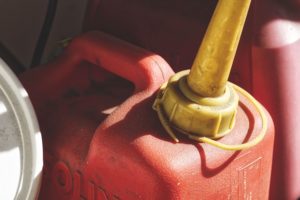Gasoline is something most of us keep around without giving it much thought—usually in a red plastic gas can sitting in the garage, shed, or trunk. However, gas can explosions are a serious and overlooked risk, especially during hot weather or when stored improperly.
If you’ve ever wondered, “Can a gas can explode in the sun?” or “Is it safe to leave a gas can in my car?”, the short answer is: no, it’s not safe. Here’s why—and what you can do to protect yourself and your family.
If you or a loved one suffered injuries due to a gas can explosion, you may qualify to obtain compensation from product manufacturers and others who bear liability. A abogado de producto defectuoso can review your claim at no cost and advise you of your options. Contact a personal injury attorney near you today for a free consultation.

¿Qué hace que exploten las latas de gasolina?
A gas can explosion doesn’t just happen out of nowhere. It usually involves a combination of heat, fuel vapor, pressure buildup, and an ignition source. When these factors align, even a small spark can lead to a devastating fire or explosion.
The role of gasoline vapors
Gasoline is highly flammable—not just the liquid itself, but the vapors it gives off. In fact, it’s often the vapors that ignite first. These vapors can accumulate inside the can or in the surrounding area, especially if the container isn’t sealed properly or is exposed to heat.
If you’re wondering, “Can a gas can explode in the sun?”, the answer is yes—especially plastic gas cans left in direct sunlight. As temperatures climb, gasoline inside the can heats up and produces more vapors. In a sealed environment like a closed garage or the trunk of a car, this can lead to dangerous pressure buildup.
Heat + pressure = danger
Heat is one of the biggest triggers for gas can explosions. When a plastic or metal can is exposed to high temperatures—like those inside a parked car on a summer day—the gasoline inside begins to vaporize. These vapors increase pressure inside the can.
Without proper ventilation or safety features like a flame arrestor or spring-loaded cap, vapors can leak into the air. Once those vapors reach an ignition source—a cigarette, power tool, static spark, or even a hot exhaust pipe—a gas can explosion becomes very likely.
Static electricity and sparks
Many people don’t realize how easily static electricity or mechanical sparks can ignite gasoline vapors. If you’re refueling equipment or pouring gas from one container to another, any small static discharge could ignite the vapor cloud. This is especially true when using older or inexpensive plastic gas cans that lack basic safety protections.
Common ignition sources include:
- Lit cigarettes or matches
- Pilot lights on water heaters
- Electrical tools or extension cords
- Vehicle exhaust systems
- Friction sparks from metal surfaces
- Open flames or campfires nearby
Lack of flame arrestors in plastic cans
Another key reason gas cans explode is the absence of a flame arrestor. Many low-cost plastic gas cans are sold without this critical safety feature. A flame arrestor is a small piece of metal mesh installed in the spout. It is designed to block flames from traveling back into the can and igniting the vapors while allowing gas to pour from the spout.
Without a flame arrestor, even brief contact with a flame can trigger an internal explosion—turning the gas can into a fireball.

The dangers of storing gasoline in a garage or hot car
Storing gasoline may seem harmless, especially when it’s sealed inside a red plastic gas can. But under the wrong conditions, it can be a serious fire and explosion hazard—especially if kept in a hot garage or inside a parked car.
Many people don’t realize that gasoline doesn’t need a direct flame to ignite. The vapors alone, when exposed to heat or sparks, can cause a gas can explosion that results in severe injury, property damage, or worse.
Why garages are risky storage spaces
Garages are common places to store gasoline, but they often create the perfect environment for disaster.
Even on moderately warm days, garages can reach dangerously high temperatures—especially if they’re not climate-controlled or well-ventilated. As temperatures rise, gasoline begins to vaporize. These vapors are extremely flammable and can accumulate quickly in enclosed spaces.
Once those vapors mix with air in the right concentration, all it takes is a single spark—from a power tool, water heater, light switch, or extension cord—to ignite them. In that moment, your garage could become the site of a gas can explosion.
Can you leave a gas can in a hot car?
Absolutely not. Leaving a gas can in a hot car, even for a short time, is extremely dangerous. During the summer months, the interior of a parked car can reach over 140°F (60°C) in less than an hour. That kind of heat can cause the gasoline inside the can to expand, build pressure, and release vapors.
If those vapors leak from the can—either through a faulty seal or pressure release—and encounter an ignition source, the entire vehicle can catch fire or explode. This is particularly true with plastic gas cans, which are more susceptible to heat and are often sold without pressure-relief features or flame arrestors.
Will a gas can explode in the sun?
Yes, a gas can left in direct sunlight can explode—especially if it’s plastic. Sunlight heats the surface of the can, warms the gasoline inside, and increases vapor pressure. Over time, this pressure builds until vapors escape or the can deforms, cracks, or even bursts.
Additional risks in hot or confined spaces
- Tipping hazards: Plastic cans can easily be knocked over or punctured in cluttered garages, increasing the chance of spills and vapor release.
- Proximity to tools: Garages often house electrical tools, power strips, and battery chargers that can all spark.
- Static buildup: Even simple movement of gasoline inside a plastic container can generate static electricity.
Can gas spontaneously combust?
You might also wonder, can gas spontaneously combust? While gasoline itself doesn’t ignite on its own under normal conditions, its vapors can combust when exposed to heat or a spark. So while it may not explode without a trigger, a poorly stored gas can could create the perfect conditions for combustion—especially in hot, enclosed spaces.
Real risks: injuries and deaths from exploding gas cans
Every year, thousands of adults and children suffer burns, injuries, and even death from gas can explosions. Many of these incidents happen because of improper storage, lack of flame arrestors, or attempts to use gasoline unsafely.
According to the American Academy of Pediatrics, over 40,000 children visit the ER each year due to gasoline-related accidents. These include burns from explosions, chemical exposure, and inhalation injuries.
How to safely store and use gasoline
There’s no substitute for caution when it comes to handling gasoline. Here are important steps to reduce your risk:
Never leave a gas can in a hot car
Leaving a gas can in your car—especially in the trunk—is incredibly dangerous. Cars heat up quickly, and that trapped heat builds pressure inside the can. Vapors can escape, and if an ignition source is nearby, a gas can explosion is possible.
Don’t use gasoline to light fires
Pouring gasoline onto a fire—even one that looks like it’s going out—is one of the most common ways people get burned. The flames can travel up the stream and ignite the can, causing it to explode in your hands.
Avoid using gas as a cleaner or weed killer
Gasoline is sometimes misused as a solvent or to kill weeds, but this is both unsafe and environmentally harmful. Stick to its intended use: fueling gasoline-powered engines.
Keep gasoline out of reach of children
Children often don’t understand the risks of flammable liquids. If they knock over a plastic gas can or try to pour it themselves, tragedy can strike. Store gasoline in a locked cabinet or high shelf, well out of their reach.
Safer alternatives: upgrade to a professional-grade gas can
The best way to protect your home is to replace plastic gas cans with safer, professional-grade models. Look for:
- Metal construction for durability and reduced fire risk
- Flame arrestors to prevent internal ignition
- Spring-loaded caps that automatically seal
- UL certification for added peace of mind
Yes, they cost more than plastic cans—but when it comes to safety, the investment is worth every penny.
What kinds of compensation could I receive from a gas can explosion claim?
If you or a loved one suffered injuries due to a gas can explosion, you may be entitled to significant financial compensation. These cases often involve product liability, especially when the gas can lacked essential safety features like a flame arrestor or a pressure-relief mechanism.
Whether you’ve experienced severe burns, emotional trauma, or financial strain from medical bills, a legal claim can help you recover the damages you’ve suffered—and hold the manufacturer accountable. With an attorney’s help, you could obtain damages for:
Gastos médicos
Burn injuries can require extensive and ongoing medical care, including:
- Visitas a la sala de emergencias
- Estancias hospitalarias y cirugías
- Skin grafts and reconstructive procedures
- Rehabilitation and physical therapy
- Medicamentos recetados
- Future medical needs or long-term care
Dolor y sufrimiento
Exploding gas cans often cause severe burns, permanent scarring, and intense physical pain. Victims may also suffer from emotional trauma, anxiety, depression, and post-traumatic stress disorder (PTSD) after the incident.
Pain and suffering compensation is meant to account for these non-economic damages, which don’t show up on a medical bill but still take a serious toll on your quality of life.
Pérdida de salarios y pérdida de capacidad de ingresos
If your injuries forced you to miss work, you may be able to recover:
- Lost income during your recovery period
- Future wages if you’re unable to return to your previous job
- Loss of earning capacity if you’re permanently disabled
Desfiguración o discapacidad permanente
Gas can explosions can leave behind life-altering injuries. If you’re facing permanent scarring, amputations, or a long-term disability, you may be entitled to additional compensation for the lasting impact on your daily life, relationships, and emotional well-being.
Daño a la propiedad
In some cases, explosions may also cause damage to vehicles, homes, garages, or personal belongings. If the incident occurred inside a structure or vehicle, a legal claim can help you recover the cost of repairs or replacements.
Daños por muerte por negligencia
If a gas can explosion kills a loved one, surviving family members may be able to file a wrongful death claim. Compensation in these cases may include:
- Gastos de funeral y entierro
- Loss of companionship or parental guidance
- Lost future income
- Emotional suffering for the surviving spouse or children
Who can be held responsible?
In many explosion-related injury claims, the gas can manufacturer may be liable for producing an unsafe product—especially if it lacked a flame arrestor or adequate warning labels. In some cases, other parties could also share liability, such as:
- Retailers who sold a defective product
- Distributors or importers
- Property owners who failed to maintain a safe environment
An experienced attorney can investigate the incident, identify the liable parties, and build a case for full compensation.
Injured by a gas can explosion? Talk to a burn injury attorney
If you or someone you love has been burned or seriously injured by an exploding gas can, you may have legal options. In many cases, gas can manufacturers have failed to include basic safety features, even though they’ve known about the risks for decades.
Our team at Allen, Allen, Allen & Allen has extensive experience handling burn injury and product liability cases. We can investigate your case, identify manufacturing defects, and fight for the compensation you deserve.
Póngase en contacto con nosotros hoy for a free consultation. Let us carry the legal burden so you can focus on recovery.



